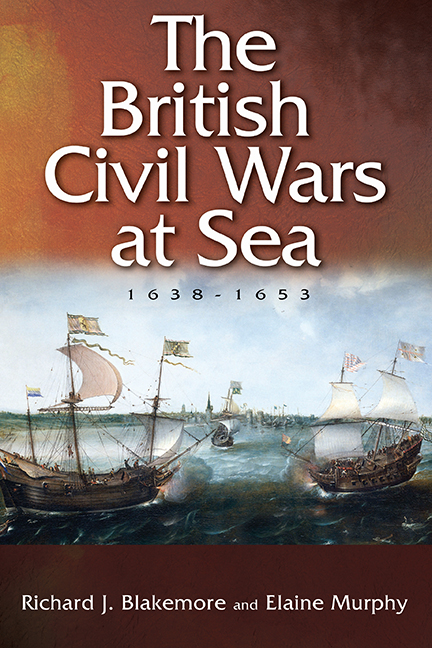Book contents
- Frontmatter
- Dedication
- Contents
- List of Illustrations
- Preface and Acknowledgements
- List of Abbreviations
- Map
- Introduction
- 1 Warfare at Sea in the Early Modern Period
- 2 The Outbreak of War, 1638–1642
- 3 The War at Sea, 1642–1646
- 4 Parliament's Navy, 1642–1646
- 5 Royalist, Confederate, and Scottish Naval Efforts, 1642–1653
- 6 Revolution, 1647–1649
- 7 Conquest, 1649–1653
- Conclusion
- Appendix 1 Timeline of the Civil Wars at Sea, 1638–1653
- Appendix 2 Parliamentarian Fleets, 1642–1649
- Bibliography
- General Index
- Index of Ships
2 - The Outbreak of War, 1638–1642
Published online by Cambridge University Press: 19 July 2019
- Frontmatter
- Dedication
- Contents
- List of Illustrations
- Preface and Acknowledgements
- List of Abbreviations
- Map
- Introduction
- 1 Warfare at Sea in the Early Modern Period
- 2 The Outbreak of War, 1638–1642
- 3 The War at Sea, 1642–1646
- 4 Parliament's Navy, 1642–1646
- 5 Royalist, Confederate, and Scottish Naval Efforts, 1642–1653
- 6 Revolution, 1647–1649
- 7 Conquest, 1649–1653
- Conclusion
- Appendix 1 Timeline of the Civil Wars at Sea, 1638–1653
- Appendix 2 Parliamentarian Fleets, 1642–1649
- Bibliography
- General Index
- Index of Ships
Summary
Historians now largely agree that the events of the mid-seventeenth century were a truly ‘British’ crisis: that, in Conrad Russell's evocative phrase, the three Stuart kingdoms had a ‘billiard ball effect’ upon one another. Although each kingdom experienced a distinctive path to war that was contingent upon local as well as national circumstances, the collision of these circumstances resulted in conflict engulfing the whole of the British Isles and Ireland. In broad terms, Charles I's policies provoked resistance and then rebellion in Scotland and Ireland, which altered the political situation in England, sparking off issues there that were already potentially divisive.
The role and importance of naval warfare in this period of conflict is complex. In 1638, Charles I could set out a substantial fleet of state-owned men-of-war and hired merchantmen to deal with his disorderly Scottish subjects; yet by the time the king raised his standard at Nottingham in August 1642 the naval situation had altered radically. Parliament had taken control of most of the navy in which Charles had so lovingly invested during the 1630s, and the king was reduced to relying on his supporters to put ships into his service, while the rebels in Ireland had begun to acquire a force of privateers that threatened England's overseas trade. This chapter therefore seeks to examine how the opening stages of the civil wars developed from a maritime perspective. After briefly describing the tensions which emerged in Charles's reign, it will explore the navy's actions during the Bishops’ Wars in Scotland and rebellion in Ireland, how the king lost and parliament won the support of the main royal fleet, and how privateering came to be a major part of the naval strategies for all the protagonists.
The road to rebellion, 1625–38
Both political and religious problems emerged from policies undertaken by Charles's government during the 1620s and 1630s, although there has been a lively debate about just how unpopular royal governance was, provoked by a more sympathetic rendering of Charles by Kevin Sharpe and Mark Kishlansky. Few scholars have accepted their arguments entirely, and certainly some policies proved contentious, in particular financial ones. Ruling without parliament in England, Charles turned to questionable methods for raising money.
- Type
- Chapter
- Information
- The British Civil Wars at Sea, 1638–1653 , pp. 35 - 57Publisher: Boydell & BrewerPrint publication year: 2018

